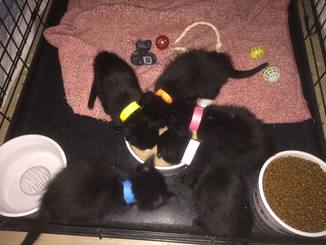
For the second time this year, the town of Lorette, Manitoba has hired an animal control service to perform a cull of free roaming cats. The reason given is that there are too many free roaming cats in town. According to the company hired to perform the cull, pet cats with identification will be returned to owners, friendly cats with no identification will be rehomed, and feral cats will be destroyed. The hope is that this will reduce the population. It seems that no thought has been given to the kittens orphaned by the cull.
Over the past few days I have seen, first hand, the effect the cull is having. Five starving kittens were brought to us by a citizen of Lorette. Sadly, a dog got to the litter before they could be rescued, and a sixth kitten was killed. Two other groups have taken in kittens orphaned by the cull, as well. There are undoubtedly many more starving and dieing in horrible ways. Of course, rescues and shelters will continue to help as many of the kittens as we can, but not all of them will be found in time. They will suffer horribly, because of the short sighted, thoughtless actions of a few elected officials.
Sadly, the money the town has spent to kill cats has been completely wasted. Lorette has embarked upon the one course that is virtually guaranteed to increase the number of cats living on its streets. Removing some of the cats frees up resources (food and shelter) for the remaining cats. Those cats will, in turn, have larger litters of kittens, and more of those kittens will survive into adulthood, joining the breeding population. By spring of next year the town very likely will have more cats and kittens roaming the streets than were there to begin with. Many of those will be the offspring of cats that were smart enough to avoid the traps set for them, and those smarter genes will be passed along (survival of the fittest), making future management efforts more difficult.
Lest anyone think that the town should forget about control, and go for eradication, I would remind them that total eradication is a long term, grotesquely expensive process that could only succeed on a small island. Even there, success is a relative term -- the after effects of eradication are often worse than any problems caused by the cats: http://www.tufcat.co.za/?page_id=7341
I would also remind you that animal control agencies all over North America have been killing cats for more than 100 years, in an effort to control their numbers. Hundreds of millions of cats have died at their hands. At no point in that time has the population ever gone down.
Truly the saddest thing about all of this is the fact that the town of Lorette was offered help to set up a humane, sustainable, cost effective cat management program. Several organizations reached out to offer that help. It was rejected.
Over the past few days I have seen, first hand, the effect the cull is having. Five starving kittens were brought to us by a citizen of Lorette. Sadly, a dog got to the litter before they could be rescued, and a sixth kitten was killed. Two other groups have taken in kittens orphaned by the cull, as well. There are undoubtedly many more starving and dieing in horrible ways. Of course, rescues and shelters will continue to help as many of the kittens as we can, but not all of them will be found in time. They will suffer horribly, because of the short sighted, thoughtless actions of a few elected officials.
Sadly, the money the town has spent to kill cats has been completely wasted. Lorette has embarked upon the one course that is virtually guaranteed to increase the number of cats living on its streets. Removing some of the cats frees up resources (food and shelter) for the remaining cats. Those cats will, in turn, have larger litters of kittens, and more of those kittens will survive into adulthood, joining the breeding population. By spring of next year the town very likely will have more cats and kittens roaming the streets than were there to begin with. Many of those will be the offspring of cats that were smart enough to avoid the traps set for them, and those smarter genes will be passed along (survival of the fittest), making future management efforts more difficult.
Lest anyone think that the town should forget about control, and go for eradication, I would remind them that total eradication is a long term, grotesquely expensive process that could only succeed on a small island. Even there, success is a relative term -- the after effects of eradication are often worse than any problems caused by the cats: http://www.tufcat.co.za/?page_id=7341
I would also remind you that animal control agencies all over North America have been killing cats for more than 100 years, in an effort to control their numbers. Hundreds of millions of cats have died at their hands. At no point in that time has the population ever gone down.
Truly the saddest thing about all of this is the fact that the town of Lorette was offered help to set up a humane, sustainable, cost effective cat management program. Several organizations reached out to offer that help. It was rejected.

 RSS Feed
RSS Feed